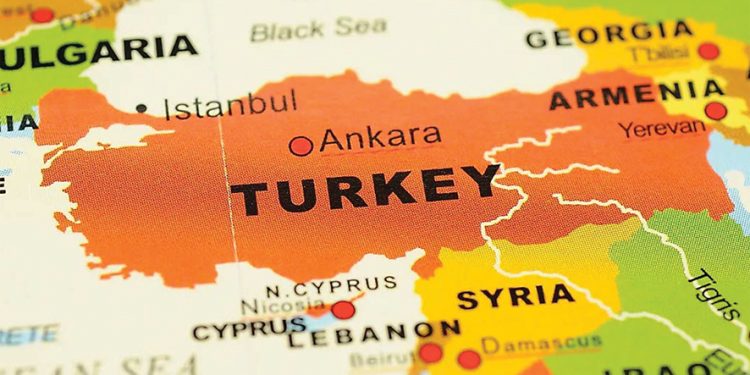The greater Black Sea region has established itself as a regular issue on the agenda of current discussions on security in Eurasia. This is not surprising in light of the processes that have developed over the last decade. This issue has become more relevant due to the indirect (proxy) conflict between the great powers in Ukraine and the First World Economic War. It is a fact that the aforementioned confrontation has more clearly highlighted the importance of military-political domination over the Black Sea and the adjacent territory. The reason is that the region in which Georgia is located, in the context of renewed strategic competition, is becoming a new dividing border – a kind of “geopolitical West Berlin” (if it is not already established as such).
In addition to its importance in the context of Eurasian security as a whole, the greater Black Sea region is the gateway of critical transit routes through the South Caucasus to the Eastern Mediterranean countries, as well as to the Middle East and the Western Balkans, a key hub in this unified logistics network.
A Feeling of Inadequacy…
In spite of this, the accentuated attention to the Black Sea region is mostly observed in academic and research circles. It is clear that this is also a very useful and necessary forum for shaping public opinion. However, in light of the challenges in the context of current events, academic journalism alone is not enough: it is necessary to adequately translate the status of the region into strategic policy documents, as well as to develop practical recommendations for managing related threats.
From this point of view, let us look at the status quo that has developed in our country in the direction of Euro-Atlantic integration. This is the very direction, apart from the constitutional provision, that is firmly embodied in the choice arising from the broad public consensus (neither the 2008 plebiscite nor the will expressed in political and legal acts suggest any other conclusion). We believe that the position of the Georgian State’s partners in this regard does not create a sense of the desired, and their practical mechanisms should be brought into line with time and reality as soon as possible.
For example, the 2022 national defense strategy of Georgia’s strategic partner, the United States of America, completely disregards the problem of the Black Sea region and in this respect corresponds neither to time nor to reality. Objectivity requires us to say that this flaw in the US doctrinal approach seems to be compensated by the transformation of the US Black Sea Security Bill initiated in Congress into a valid law. However, along with the inconsistency in the general program documents, the delay in the consideration of the bill deserves serious criticism.
We believe that the North Atlantic Alliance does not meet the necessary requirement either, when in contrast to the “zone of privileged interests” of the Black Sea region in the Russian sense, NATO refers to this region as having “strategically vital importance” for the Alliance. The words “strategic” and “vital” may have a satisfactory content in literary terms, but the Alliance’s statement is still inferior to Russia’s in terms of geopolitical register. This relative ambivalence is all the more surprising because in the strategic concept adopted at the Madrid Summit of 2022, the North Atlantic Alliance stated that the “great competition” between “revisionist, brutal and aggressive Russia” and the “democratic world” will be through the Black Sea. In our opinion, in terms of the real reassessment of the role of the Black Sea region, the text of the Vilnius Summit does not really stand out either.
Let’s also recognize that…
…the lack of a unified and orderly Western strategic approach to the Black Sea region can be explained by a number of objective difficulties. For example, the ongoing war in Ukraine has completely “consumed” diplomatic resources and seems to have sharply reduced the space for calm judgment and analysis of the big regional picture. It should also be said here that the sense of inadequacy in terms of policy making is focused not only on the overall regional security picture, but also on the political end of the military phase in Ukraine itself – and this despite Ukraine’s outstanding priority.
The next consideration to be taken into account is the maximum mobilization of Western resources due to the ongoing war in Ukraine, which, at least in the medium term, may significantly limit the means of neutralizing threats from China in the Indo-Pacific Basin. Such a forced limitation is particularly noteworthy from the perspective of the United States of America – a globally influential country which, in addition to American “privileged interests” in said basin, has for many decades traditionally given equal priority to resource self-sufficiency for active influence in the two geopolitical zones (Europe/Asia).
Thus, with the protracted war between the camp of Russia and its allies on the one hand, and Ukraine and its allies on the other, one should consider how resource-limited the West can become in the Black Sea region. This issue is as relevant as further strengthening the defense capabilities of the US and its allies in the region. This relevance is justified by at least two practical considerations: first, the same US National Defense Strategy states that alliances and partnerships “build US strength that is critical to achieving its objectives”; and the second is that in order to balance the distribution of resources between Europe and Asia, the resilience of allies and partners in the Black Sea region and the improvement of their defense capabilities are essential.
When pointing to the West, we should not forget the fragmented geopolitical landscape of the Black Sea region. There are at least three groups of countries here, and all three have their different positions regarding relations with Russia or the current war. This, too, obviously hinders the laying of strong and clear foundations for a unified and coherent regional security. Worth mentioning is the peculiarity of the Turkish factor, a country whose foreign policy axiom – “Turkey always does what’s most suitable for it” – is both the key and the puzzle of regional cooperation.
And one more point, because we promised frankness in the title of this article. Yes, today we can confidently say that Russian dominance in the Black Sea region is out of the question – this is dictated not only by the course of hostilities in Ukraine, but also by the regional and sub-regional dynamics of recent years. This is a given that is formed “on the spot”, no matter how Moscow claims the Black Sea region as a “zone of its privileged interests”. At the same time, realism requires us to realize and, accordingly, to adjust and even prepare for the fact that the Russian footprint in the region will not disappear completely, will not evaporate (it should be recalled that for the Russian Federation the Black Sea is also an instrumental springboard for advancing its interests in Syria and the eastern Mediterranean). Neither Russia’s status as a regional player and economic agent, nor simply its geographical location can serve as a prerequisite for a different attitude in the foreseeable future. Therefore, the need for maximum flexibility and sustainability of the Georgian security doctrine, including through its real integration into effective security systems, is all the more inevitable.
A few “theoretical” speculations
Before formulating some important practical recommendations, which we believe are dictated by the context of contemporary processes and practical needs, we find it necessary to name some basic principles as well. In our view, highlighting them will help us to identify specific initiatives and better understand them:
Risk analysis: without unifying the assessment of risks and threats from the Black Sea partner countries, the development of a common and comprehensive security strategy for the region will be difficult.
In this process, together with the countries of the greater Black Sea region (especially taking into account the interests of the littoral countries), the Western coalition should have a sensible and pragmatic understanding of:
(a) What are the specific risks and threats facing the countries of the region?
(b) What specific assistance can be provided to these countries to mitigate risks or manage threats?
(c) How meaningful and result-oriented can Western (co)engagement in cooperation for regional security be?
Finally, any comprehensive vision for the region should include a coherent and unified set of measures, not only military, but also economic, energy, diplomatic and informational. Only in this case and under this condition will the vulnerable national security systems in the region feel if not fully protected, then have a sense of support guaranteed by an effective aid package in times of crisis.
The so-called “Ethnic conflicts”: we have repeatedly said that the conflicts in the Georgian territory, whether in Abkhazia or Tskhinvali, are actually and mainly geopolitical in nature, rather than ethnic. In other words, these conflicts – from their incitement to the “recognition of territories” – are a harsh response by the Russian Federation to Georgia’s foreign policy priorities.
It is worth noting that the understanding of the true genesis of these conflicts in Western sources has been slow and gradual. However, there are still cases of deviations from the essence, which must be stopped once and for all, since classifying them as “ethnic conflicts” is an unwitting support of the Russian narrative and “legitimization” of the presence of Russian military units in these territories. It is clear that half-way qualification of this issue or an attempt to adapt to one’s own geopolitical comfort, among other problems, worsens the security situation in the greater Black Sea region and creates an additional barrier to overcoming the current challenges.
There is another opinion concerning the possible resolution of these “ethnic conflicts” by political means. It is connected not only with the participation of our partners in the existing formats of peace talks, but also with the search for the newer, more effective formats. In addition to the reintegration of Georgian territory, the West must realize that the goal of such activity will be to reduce Russian influence in the “near abroad” in the Russian geopolitical concept and to neutralize its “zone of privileged interests” as much as possible. Let us only add that this is one of those issues in respect of which, after the collapse of the Soviet Union, the Western geopolitical approach has long “sinned” by tacitly recognizing Russian exclusivity over a significant part of Russia’s neighborhood.
Security for the region: Today, we hear often and much that the outcome of the ongoing war in Ukraine will have a great impact on the countries of the region. It is not disputed that this is true.
At the same time, it is necessary that official Tbilisi also frequently repeats in public that security and stability in the greater Black Sea region is not determined by Ukraine alone. In other words, the guarantees given to Ukraine are not enough for Georgia’s security, as well as for the security of other vulnerable countries in the region. Therefore, even while recognizing that the Russian-Ukrainian war in the context of Black Sea regional security is indeed a watershed moment, it is critical that allied and partner countries perceive the security of the region in a larger format and not just in the prism of one particular country, even Ukraine.
The Turkey factor: Turkey’s role in the greater Black Sea region is such that no matter how one tries to build a security model, any attempt without taking Ankara into account will be half-meaningful. There are a lot of reasons why this is so and not otherwise, and we can name a number of arguments of which the reader is well aware.
Clearly, we perfectly realize that talking about a large region in the context of this particular issue undoubtedly requires a very delicate approach: and not only in deeds but also in words. We will also be delicate and mention only a few “obvious” aspects. In particular, the following should be taken into account in the interests of regional security:
(a) Synchronization of Turkey’s actions with the West, the course of the process, its prospects, objective and subjective circumstances;
b) Creation of additional guarantees of safe navigation in the waters of the Black Sea. It is doubtful that Turkey will announce its readiness to revise the Montreux Convention in the near future, but the war in Ukraine has revealed the need for “compensatory mechanisms” ensuring unrestricted navigation;
(c) Turkey’s contribution to additional political and diplomatic opportunities for strengthening security of the Black Sea region.
To be continued.
By Victor Kipiani, Geocase Chairman














